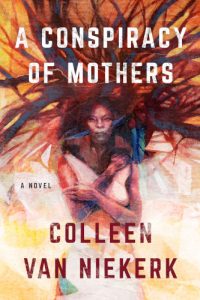The JRB presents an excerpt from A Conspiracy of Mothers by Colleen van Niekerk.

A Conspiracy of Mothers
Colleen van Niekerk
Little A, 2021
Read the excerpt:
YOLANDA
Pain had a pattern to it. The bearing of it, that unsteady balance. Then the hurtling down, winded, beneath its smothering weight. You tried to figure out what had been scraped or ripped loose this time. The pattern carved tracks in you. Although you were still here, although you had survived, it felt like a little less of you was left every time, a little more to rebuild.
As the screen door to her porch snapped shut behind her, Yolanda weighed whether she had the will to disrupt those old patterns. She had kept to herself all day, hadn’t ridden out on her motorbike, hadn’t visited Garrick at the farmhouse, hadn’t worked. Instead she’d smoked, sat on her porch. She’d considered the sacred: her mother and her daughter. She’d asked herself what could be worse than the previous evening’s flashback.
Even the trip that had brought her here four years ago, a ride out of New York with too much vodka coursing through her body, had not been as bad. Distraught, she’d meant to ride all the way to the Florida Keys that day, then walk into the Atlantic, offering herself as a package of bone and blood to drift back toward Africa. Instead, her bike had failed on the interstate near Virginia’s Fauquier County, and Garrick had stopped to help, his mother, then alive, watching from inside the truck. Even then Yolanda sensed that Garrick could tell she was in trouble, that she needed more help than she was going to ask for. There was anguish in him but no malice. There was care. He was the kind of man who gave help more often than he should have. ‘Come on, there’s a place near here makes a mean pulled-pork sandwich,’ his mother called.
‘Come join us. You look hungry.’ The bike was quickly fixed, but by the end of the meal Yolanda had sobered up. She didn’t like riding in the dark, so she lingered, drawn to Garrick, feeling what he felt. She stayed with them that night, relieved to be outside New York’s mesh of urbanity. They offered her room and board if she helped his ailing mother with the horses they boarded. She’d stayed.
Now, walking toward the main house as twilight fell, Yolanda knew Garrick had been around all day, tending to the horses, cleaning the stables, fixing things. He’d kept an eye out but left her alone. As she watched him come out with his flashlight and whistle for his dogs, she remembered how long it had taken her to convince him he didn’t need to bring a gun out on their evening strolls.
‘Virginia is an open carry state,’ he’d argued.
‘You’re carrying enough, Garrick,’ she’d murmured. The Gulf War was still in him. As they fell in beside each other on the footpath, he simply asked how she was doing, and she gave a small nod, an OK. They often walked like this until long after nightfall, each a prisoner to the same restlessness, the same contested darkness. They could sense the jaggedness of each other’s wounds and, despite that, the capacity each still had for tenderness. Often, unwilling or unable to speak, they strolled in silence, sometimes holding hands, sometimes holding each other upright, other times simply beside each other, not touching at all.
‘How do you return home, Garrick?’ she asked as they followed an old trail toward the hills. ‘After war.’
For a long time, there was only the crunch of his boots.
‘A friend of mine,’ he said at last, ‘a guy from Harrisonburg—I met him on my first tour. He was part of the platoon I got assigned to, infantry. Like me, he was deployed a bunch of times. He came home to a hero’s welcome; he’d moved up in rank by the time he left. His life looked like a postcard: white picket fence, golden retriever, proud wife, one kid, another on the way.
‘People fell all over themselves to hire him. He planned to go back to school. Shaft—we called him Shaft; his name was Darren—always had a head for numbers. His health took a beating in Kuwait, you could see that, but he held it together.
‘One Saturday morning in July, real early, he got up, put on his dress uniform, went to the shed behind his house, balanced on a wheelbarrow, and shot himself in the head with a .45. No note, nothing, just a wheelbarrow to make sure his wife could move the deadweight of his body.’
They stopped. Yolanda couldn’t make out Garrick’s expression in the near dark.
‘He had come home, he had made it, and all he figured in the end is that a beautiful summer’s day was the perfect day to die. War fucks you up, Yolanda; there’s no question. There’s no glory, no swagger. You bring the dust and the heat, the blood, the smell—it all comes with you. Everything sticks to you like dirt.
‘I carry every soldier I tried to put back together and the ones I couldn’t do anything for. I had to make decisions about people’s lives, their limbs. I’ll never be clean again; I’ll never be who I was.’ He looked over in her direction. ‘But I think you already know that.’ He paused. ‘What home is for you depends on acceptance: what was gone is gone; you have to build something else. It’s a kind of death.’
Yolanda knew that his children, to whom he’d had limited access for the longest time after a bruising divorce, were top of mind.
‘Shaft’s wife and the rest of us would have done anything for him, helped him shoulder it, whatever he needed us to do. If he gave us the chance. But now he’s dead.’
They stood in silence. When they walked onward, their fingers brushed, and he took her hand. ‘Yolanda,’ he said, ‘at some point, you’ve got to trust somebody, trust that they’re going to hold you up. And you’ve got to trust yourself, trust that you’ll stand up and stay on your feet.’ ‘But I’m safe here. I know how to do this, be this, live this way.’
‘OK.’ Garrick paused. His voice was soft. ‘But how much living are you really doing?’ They walked toward a rocky outcrop. The past was home. Home meant facing the past. Rachel’s two words nudged and wheedled, and Yolanda knew now, in a way she couldn’t articulate, that she had to go back. But she had no idea how she was going to do it.
~~~
- Colleen van Niekerk was born and raised in Cape Town, South Africa, and now lives in Vancouver, Canada. A Conspiracy of Mothers is her debut novel.
~~~
Publisher information
From a bold new voice in literary fiction comes a compelling story of three mothers whose lives intersect during a generation-defining period in South Africa’s history.
The year is 1994, and South Africa is in political turmoil as its first democratic election looms. Against a backdrop of apartheid and racial violence, traumatized artist Yolanda Petersen returns from the Appalachian foothills to the land of her youth at the behest of her mother. While there Yolanda longs to reconnect with her estranged daughter, Ingrid, the product of an illegal mixed-race affair with a white man.
But Ingrid is missing, and as Yolanda quickly discovers, she isn’t the only woman in Cape Town desperate to protect her own. Ingrid’s very existence is proof of a white man’s crime, and that man’s mother will do anything—even kill—to ensure the truth remains buried.
An evocative debut novel set during a defining period in history, A Conspiracy of Mothers tells a gripping story of love and betrayal from multiple perspectives while deftly balancing the painful legacy of apartheid with the trials of motherhood.





